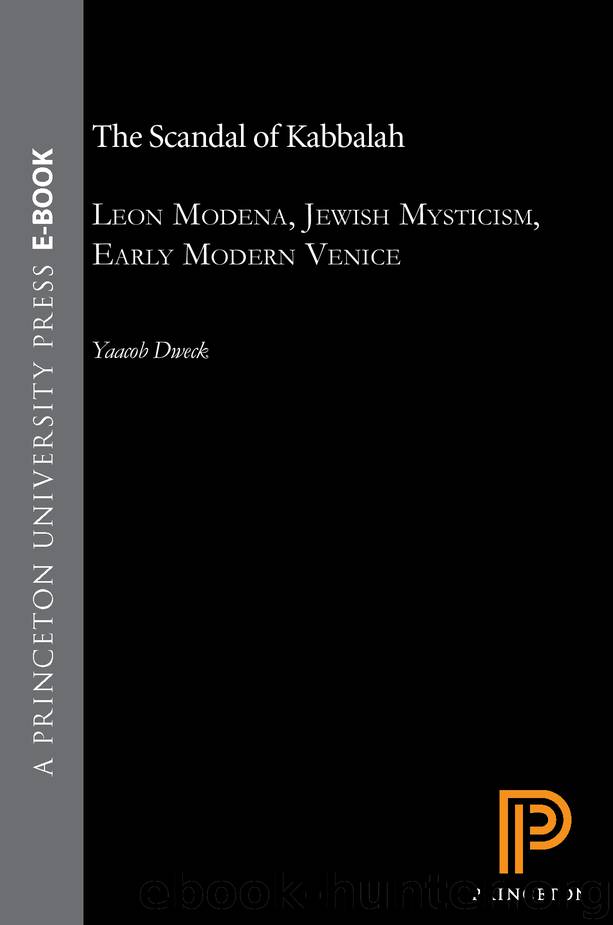The Scandal of Kabbalah by Dweck Yaacob

Author:Dweck, Yaacob
Language: eng
Format: epub
Publisher: Princeton University Press
MODENA AND CORDOVERO
Modena obtained his knowledge of Lurianic Kabbalah through a number of channels: travelers from Safed to Venice, printed hagiographies of Luria and Vital, and the kabbalistic theology of Saruq and Menahem Azariah da Fano. But Luria was not the sum total of Safed or even of Safed Kabbalah. Modena further contested Safed Kabbalah through his criticism of Moses Cordovero (d. 1570), the kabbalist who loomed largest in Safed before Luria's arrival and who had written a systematic theology of Kabbalah. 69 Modena drew largely on Cordovero's Pardes Rimonim, a synthetic treatment of Kabbalah printed in Krakow in 1592.70 Cordovero's Pardes, as Modena and other early modern readers frequently referred to it, appeared in Ari Nohem in conjunction with a variety of issues, such as the importance of humility in the study of metaphysics or the audacity of kabbalists who criticized Maimonides. However, Modena's criticism focused primarily on the nature of the sefirot and, to a lesser extent, on the definition of Kabbalah as Hokhmah. 71 Both the subject matter that Modena discussed in conjunction with Cordovero's Pardes as well as the frequency with which he referred to it offer some indication of the centrality of Cordovero and his theology to Modena's larger criticism of Kabbalah.
In the very first chapter of Ari Nohem, Modena cited a passage from Pardes Rimonim in which Cordovero argued that someone who was ignorant of the sefirot would live his entire life without wisdom.72 Quoting Cordovero, Modena wrote: “Those people to whom the nature and the existence of the sefirot have already been revealed, but they contradict them because of their corrupted minds, for they frequent the external sciences and abound in the customs of strangers,73 these people, if they are not deemed heretics and deniers because they still believe in all the theological concepts, nevertheless they should be deemed heretics because they deny an interpretation of the Oral Torah.”74 Cordovero not only argued that denial of the sefirot constituted heresy, he argued that belief in the sefirot constituted a fundamental part of the Oral Torah. In the continuation of this passage, Cordovero drew on the authority of Maimonides to establish his definition of a heretic as someone who denied an interpretation of the Oral Torah. Modena found this appalling. That a kabbalist should declare the doctrine of the sefirot a tenet of the Jewish faith was bad enough; that he used the authority of none other than Maimonides to justify the denial of this belief as heresy made it even worse.
Modena pointed to disagreement among kabbalists themselves about the nature of the sefirot as a proof that belief in them did not and could not constitute a fundamental aspect of the Oral Torah. One disagreement concerned the identity of one of the sefirot called Keter (Heb. Crown). According to Shem Tov, Keter functioned as an intermediate stage between existence and ein sof, a kabbalistic term that referred to the realm beyond existence. The crucial point for Shem Tov, and in turn for Modena,
Download
This site does not store any files on its server. We only index and link to content provided by other sites. Please contact the content providers to delete copyright contents if any and email us, we'll remove relevant links or contents immediately.
| Hebrew Bible (Old Testament) | Talmud |
| Torah | Zohar |
Man's Search for Meaning by Viktor E. Frankl(2264)
The Secret Power of Speaking God's Word by Joyce Meyer(2263)
Mckeown, Greg - Essentialism: The Disciplined Pursuit of Less by Mckeown Greg(2117)
MOSES THE EGYPTIAN by Jan Assmann(1980)
Unbound by Arlene Stein(1946)
Devil, The by Almond Philip C(1910)
The Complete Dead Sea Scrolls in English (7th Edition) (Penguin Classics) by Geza Vermes(1851)
I Capture the Castle by Dodie Smith(1579)
Schindler's Ark by Thomas Keneally(1517)
The Invisible Wall by Harry Bernstein(1464)
The Gnostic Gospel of St. Thomas by Tau Malachi(1417)
The Bible Doesn't Say That by Dr. Joel M. Hoffman(1375)
The Secret Doctrine of the Kabbalah by Leonora Leet(1272)
The Jewish State by Theodor Herzl(1256)
The Book of Separation by Tova Mirvis(1227)
A History of the Jews by Max I. Dimont(1212)
The Dead Sea Scrolls Bible by Martin G. Abegg(1206)
Political Theology by Carl Schmitt(1190)
Oy!: The Ultimate Book of Jewish Jokes by David Minkoff(1107)
